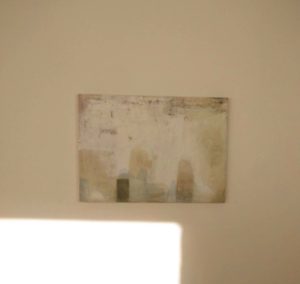Most people have (with the help of conventions) turned their solutions toward what is easy and toward the easiest side of the easy; but it is clear that we must trust in what is difficult; everything alive trusts in it, everything in Nature grows and defends itself any way it can and is spontaneously itself, tries to be itself at all costs and against all opposition” (Rainer Maria Rilke. Letters to a Young Poet. Trans. Stephen Mitchell. NY: Modern Library, 2001, p. 67-68).
The labour of the hamster wheel is what Rilke refers to as “what is easy and toward the easiest side of the easy.” In this category of difficult living, one is always going round and round in the same circle. Investing time and energy into doing the same thing over and over and over. How is this a difficulty? It is a difficulty because life is a challenge in every form one takes it. Even if one were to just sit still one would still have to endure one’s being, and there in lies the difficulty. So whether we like it or not there will always be difficulties. What are the difficulties of doing the same thing over and over? The boredom of repetition is hellish, no? The feeling of being caged is painful, no? The gut wrenching pain of wasting one’s life is depressing, no? Then there is the deep unhappiness; the aguish void of living meaninglessly. Not to forget the constant dread of death. That final end that will issue a bill of immense regret. That which would come to prove that one has chosen to live as though one were dead. Which means one had been stagnant and avoided as best as one could all opportunities of growth, thus one had rejected one’s self, and bothered little to practice being––the practice of love.
This is a difficulty reached with easy efforts, in that these efforts issue from a familiar state of a honeyed disavowing circumference. Thus one goes through the summer every year and makes the same complaints, “Ohh how wicked it is that one must be forever baking in this stupid sun!” And one does the same in autumn, “Ohh how dreadful it is that one must be plagued by all these aimless dying everywhere!” Then one does the same in winter, “Ohh how horrible it is that one must be forever suffering these deadly bites of winter!” Then one does the same in spring, “Ohh how horrible it is that one must be forever drowning in water!” Year in year out, one complains bitterly about what one cannot change. Fighting nature, denying the beauty of change and insisting hard heartedly on being inflexible.
The difficultly of the hamster wheel is that one is unhappy and one chooses to remain miserable because one refuses to believe in anything other than misery. Yet one always complains that if only love would come and rescue one. When, in fact, love is already within oneself and everywhere the eyes fall but one has chosen to be forever blind to it. Hence one is unsatisfied in a hell of one’s own making. Bitterly going round and round in the same mental process of destitution but ever so comfortable in its familiarity and in full dread of all that is outside the seemingly easy circle. The circle of the hamster wheel is like drowning slowly in a quicksand whiles one pretends as if one is not actually frozen in place and sinking to one’s death.
The category of the labour of the spiral climb is also circular, but unlike the closed circus of the hamster wheel, the spiral climb is a process of progress. It is of this difficulty that Rilke speaks; that which he recommends in saying “it is clear that we must trust in what is difficult; everything alive trusts in it.” The spiral climb is very much about choosing life: to merge with it, to learn of it, to take joy in it. Thus the spiral climb is the progress into mindfulness, from merely being alive to becoming mindful to accumulating knowledge that ferments into the wisdom of recognizing oneself as life; from merely breathing to the practice of merging with love. Whereas the hamster wheel’s height and depth never alters, and the same rigid mental process is consistent from January through December, the spiral climber’s depths and heights are ever changing.
Albeit the difficulty of the spiral stairs is more apparent, and thus easily referred to as a challenging way of living, it is actually the only fertile choice that is enthusiastic in making being about life, for the difficulty of the hamster wheel is the suffering of life on the basis of the refusal of life. Because the difficulty of the spiral climb is productive, effort and energy yields growth. In fact, the difficulty of the spiral climb uplifts one. It is a pleasurable challenge of exploring the unknown. It is the adventure of drilling down to self to understand the language of one’s being. It is seemingly difficult, but only in that it is an active choice, the continuous choosing of life, rather than the passive aggressive lifeless war on life which sums up the continuous winding of the hamster wheel.
And yet in truth, the spiral climb is easier than the circulation of the hamster wheel. How is this? It is because the spiral climber is happier and all that is done in happiness is done in joy which makes action feel effortless. The spiral climber finds his days fulfilling and meaningful. There is also the peace of flexibility and the weightlessness that issues from the ability to recognize how beautiful the summer sun shines, and how with practice one can become immune to the sun’s heat even when one does not choose to rest in the shades of a leafy tree, or seek the refreshing coolness of the sea; then there is the wisdom autumn teaches us about the beauty of living meaningfully and dying beautifully without fear; then there is the stillness of winter, and its teachings about the harmony of silence; then there is spring which makes water dance and sing as it cleans and sweeten the air while it run down to embrace the earth and help make it green and lush.
The energy required for a life of hamster wheel circulation is the same as that required for the spiral climb yet the results differ. The human being is blessed (or cursed, as some choose to believe) with choice. To get out of bed or not to get out of bed, is the question. There are instances when the easy (hamster wheel) choice is to stay in bed. Then there are times when the difficult (spiral climb) decision is also to stay in bed. So when do we know when we are choosing the right kind of difficulty? It is when the difficult aspect of the choice propels growth which points to lightness in spirit, an appreciation of life and a gratitude for life. The difficulty that gifts love, that reveals self, that makes life meaningful, that rewards beauty and fulfillment is the difficulty that is worth choosing. This is the difficulty that requires surrendering to the spiral climb and it is that which celebrates life.
Spontaneity comes easier to the rest of nature because it is programmed to follow its instinct, but the human can defy his instinct. In hunger she may choose not to eat. He can choose to be controlled by his feelings or he may choose to understand and master these feelings. Hence to choose the difficult, or the spiral climb, is merely to give your hand to life and let it lead you to its truths and beauties. And this in actuality is the easier life. In making efforts to live in a spiral climb, one only merges with what is natural, and acts like the rest of nature which, according to Rilke, “defends itself any way it can and is spontaneously itself, tries to be itself at all costs and against all opposition.”



